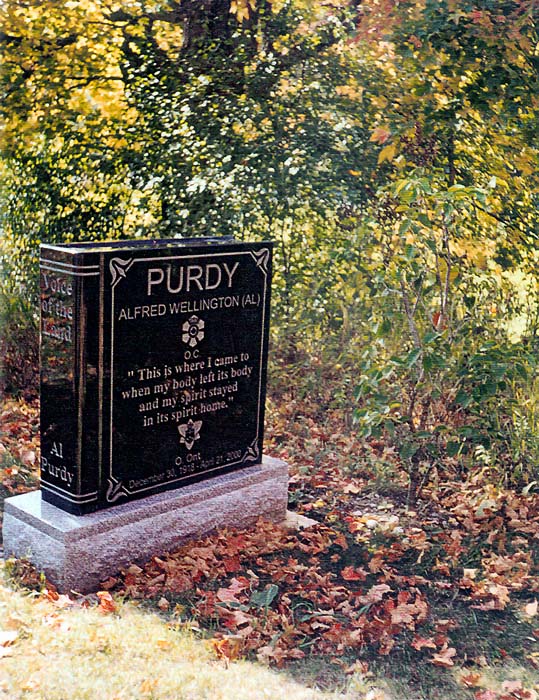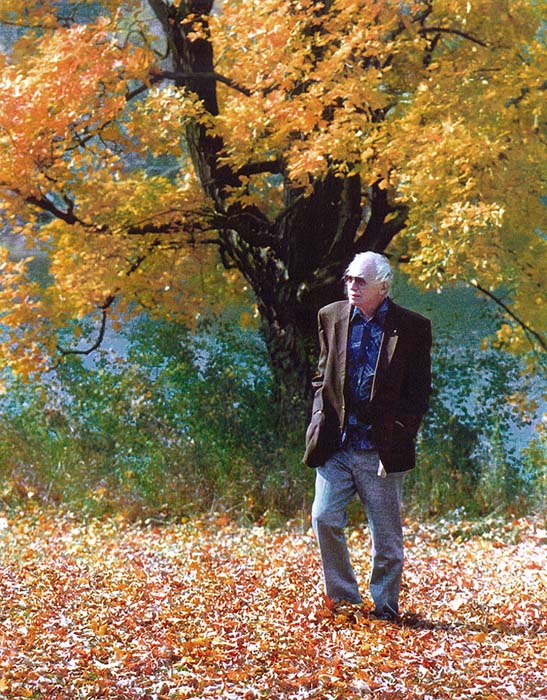Alfred Wellington Purdy
Born: Wooler, Ontario; December 30, 1918
Died: Sidney, B.C.; April 21, 2000
Buried: Ashes buried in Ameliasburg Cemetery
Photo: Linda Rogers
Gravestone epigraph
This is where I came to
when my body left its body
and my spirit stayed
in its spirit home.
Al Purdy was one of the most influential and popular Canadian poets of the 20th Century. He wrote more than 30 collections of poetry, the last of which, Beyond Remembering: The Collected Poems of Al Purdy, was published posthumously, in autumn, 2000. He won two Governor General’s Awards for Poetry, the first for The Cariboo Horses (1965), which remains one of his best-known works, the second for The Collected Poems of Al Purdy, 1956-1986. The story below, submitted by Linda Rogers, tells the poignant and humorous tale of how Al Purdy’s gravesite came to be marked with a monument of a book. Following this piece are some links to Purdy’s poems and other information on his life and work, including the Al Purdy A-Frame project, the effort to save the Purdy house in Ameliasburg, Ontario.
Voice of the Land: The story of Al Purdy’s final resting place
by Linda Rogers
Unlike some poets who only read their own work, Al Purdy’s redemption (he was crusty and somewhat misogynistic, although averse to vulgarity) was his passion for reading. An autodidact, he disdained intellectuals but in fact was a homemade scholar, all the better for his unique appreciation of words and music, especially if they were written or performed by men. Noted exceptions were Margaret Laurence, Margaret Atwood and Bronwyn Wallace.
Because Al experienced a lingering death by cigar smoke, he had time to consider life after death. Of course, he would continue absorbing language beyond, or at, the grave. Even when he was very ill, he looked forward to the daily mail and the arrival of fresh poems of appreciation from friends and fans. This could not end. There would be a bench on his grave, one where visiting bibliophiles would stop and read to the reclining poet.
My husband designed a lovely bench, but, just about the time when I was complimenting Al on his new found civility to his wife, to which he responded, “Of course I’m nice. She controls my oxygen,” we found out the bench could not sit lengthwise on the plot he and Eurithe would eventually share. They would have to purchase a double wide for double the money.
For a couple who had experienced childhood during the depression and the hard life of poetry, who had fashioned a home from other people’s scraps salvaged from yard sales and even the Ameliasburg dump, this extravagance was unthinkable. The bench was scrapped and we sat on the Purdy matrimonial bed considering options.
“I could design a book,” my husband suggested while Al pondered the many cover photo options for his posthumous collection. “Doesn’t matter,” he said, pushing them all aside. “Use the photo of my….” Did he say ass?
“They are all photos of an ass,” I said because he had irritated me earlier that day by dismissing yet another female poet.
“Ashes,” Al retorted. He was the first to notice I needed hearing aids.
After Al died on Good Friday, his Christian mother’s famous last word on the child who had fallen from grace or at least from the pew she occupied, Eurithe, Rick and I visited Victoria’s Ross Bay Cemetery, where Emily Carr rests in eternal sleep, looking for inspiration.
“I still like the book idea,” Eurtithe announced over the sound of the rain.
“He wasn’t listening,” I replied, and we both laughed. Rick was already sketching.
Al’s ashes now lie under a book entitled The Voice Of The Land, an anonymously donated award we had presented a few months earlier, and he can make up whatever words he likes for world without end as the river wanders by. When we went to open the Al Purdy library in Ameliasburg, I sat on Al’s last book and read poems to him, all of them by women. Did the earth move?
For more information on Al Purdy:
CBC Archives, including radio clips and TV interviews



